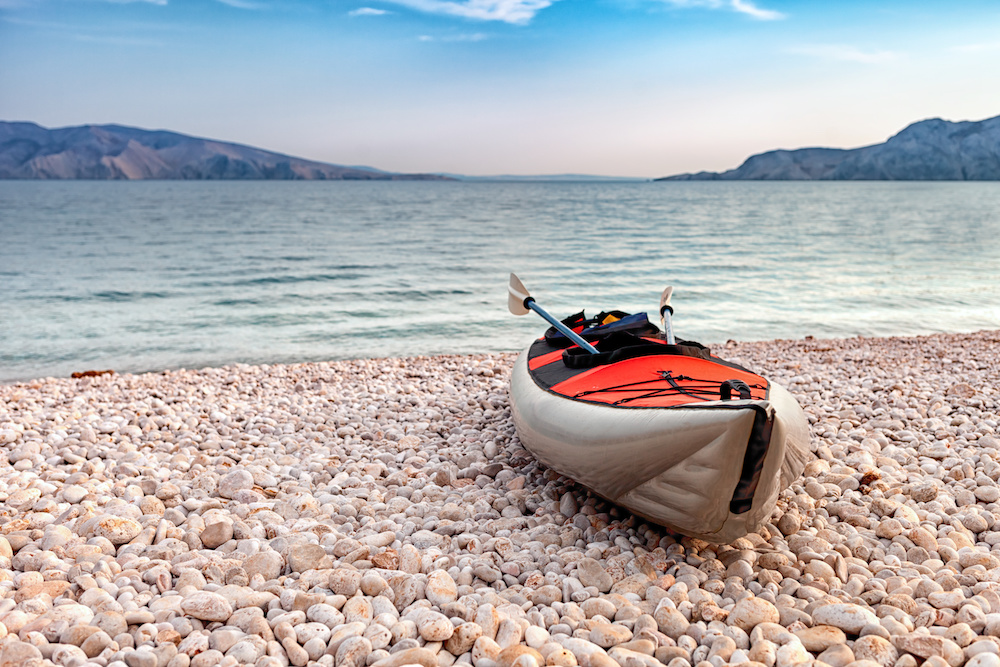Do You Need To Register a Kayak: A Complete Guide for Kayak Owners in the USA
We may earn a commission for purchases using our links. As an Amazon Associate, we earn from qualifying purchases.
Do you have a love for kayaking and traveling across boundaries?
If you do, you may have asked the same question every travel kayaker has asked.
Do you need to register a kayak?
Like driving a car, you should get some licenses to have access to beautiful places.
If you want to spare yourself from fines and problematic encounters, read on to get the fundamentals of registering one.
But is there a difference between a paddle-powered kayak and other motor or mechanically-powered vessels?
Let’s find out.
Do You Need to Register a Kayak?
If you are new to owning a kayak, you may have had the dream of taking it with you everywhere you go.
To do this anytime, you have to accomplish one step: register your kayak.
What Is Kayak Registration All About?
The primary purpose of having a kayak registered is for you to get access to public waters, widening the horizon for your adventures.
When you register your kayak, you will get issued a certificate number or card to prove your registration.
There are guidelines to getting your kayak appropriately numbered.
You should place your decal numbers on the starboard sides and port of the kayak.
There should also be no hyphens and spaces in between letters and numerals.
It should be three inches in height at the minimum and written in capital letters.
Also, they require that the color of the numbers have good contrast against the vessel’s color. You need this along with the boat tile.
The presence of your documents on the vessel is required to let you navigate in public waters.
Failure to furnish one may leave you with a ticket.
Title vs Registration
There is often confusion between a registration and a title, so let's discuss them in detail.
- Registration
Registration is as good as car registration, which means you get to travel to different states.
That said, you should do it in the place where you primarily use the kayak.
It's only good for two years, which means you will need to renew it regularly.
The expiration schedule is every March 31st of the second year.
- Title
A boat title is the same as a car title.
Unlike the registration, a boat title proves ownership.
Hence, this is the document lenders get when people try to use the boat as collateral.
The difference between them is that a boat title only needs to be furnished once. There is no need for renewal.
What Types of Kayaks Require Registration?
Anyone who owns a kayak needs to follow state regulations.
This applies to furnishing a vessel that meets the requirements and having the safety gear required.
Registration is also a part of state regulations, but these can vary depending on your current state.
In general, you should register watercraft vessels powered by gas, diesel, electric motors, or trolling motors.
While not all states require it, some also require the registration of human-powered watercraft.
That includes canoes, kayaks, and paddleboards.
So if you plan to purchase a kayak and explore the world around you, check on your state laws first.
What States Require Kayak Registration?
As mentioned earlier, there are different state regulations in terms of kayak registrations.
Each will have varying classifications and requirements.
Do you need to register a kayak in your state?
Let’s talk about the most common states in the USA requiring such.
- Washington, DC
For areas covered by the District of Columbia, all vessels should have a registration and title.
This is regardless of how they are powered and their sizes.
Canoes, kayaks, USCG documented boats, and other types of vessels are covered by this rule.
However, if your vessel has an out-of-state registration, then you won’t need to get one for it.
The exemption also applies if you navigate along the waters of the District of Columbia for not less than 50 simultaneous days.
All these are regulated and handled by the MPD’s DC Harbor Patrol.
- Ohio
If you plan to kayak along Ohio, you must coordinate with the Division of Parks and Watercraft.
That is because they require mandatory licensing for all vessels, regardless of their purpose and title status.
Recreational vessels include inflatable boats, pedal boats, kayaks, personal vessels, and canoes.
The only exemption for this rule would be those that already have out-of-state registrations.
If an out-of-state vessel is navigating for over 60 days in Ohio waters, you would still need to register your kayak.

- Minnesota
The only vessels required to register in Minnesota are motorized models.
If your vessel is non-motorized and has a size under 10 feet, then you can consider yours an exemption.
Any vessel registered with the US Coast Guard is exempted.
This also applies to out-of-the-state vessels navigating for less than three months.
The Minnesota Department of Natural Resources handles all registrations.
- Iowa
The boat registration in Iowa includes all types of motorized watercraft and paddle-type kayaks measuring over 13 feet.
If you wish to go kayaking in the state for not more than 60 simultaneous days, then you won’t need a registration.
If you own a conventional kayak or one that doesn’t have mechanical propulsion, you also won’t need to register it.
That is as long as your vessel does not exceed 13 feet.
As for inflatable kayaks, those without mechanical propulsion and have a size under seven feet don’t need to be registered.
For more details, all registration details are available at the Iowa boat registration site.
- Pennsylvania
Those who want to register their boats in the state should coordinate with the Pennsylvania Fish and Boat Commission.
In this state, they require registration for all watercraft types; small and big boats, regardless of power source.
They also issue launching permits for non-motorized kayaks.
- Massachusetts
This state has stringent processes for watercraft.
It requires registration of all kayaks before setting off regardless of how it is powered.
What States Have More Lenient Rules?
The following states are a little more lenient than the states mentioned earlier:
- Illinois
If you want to go kayaking for recreational purposes, Illinois is one of the places to go.
This state has laws that are more lenient than other states.
That is because they do not require unpowered watercraft or recreational vessels for registration.
- Delaware
Delaware has the same leniency in watercraft registration.
They do not require the registration of vessels from out-of-state and non-motorized boats.
Only those with a mechanical propelling system need to be registered.
- Oklahoma
As for Oklahoma, they are also lenient for recreational vessels.
That means there is an exemption for paddle boats, canoes, and kayaks from registration.
However, you can still get a permit for your vessel if you want to traverse along their waters.
A Quick Guide To Kayak Registration
If you plan to buy a kayak of your own and plan to take it everywhere, below are some tips.
Knowing how the registration process is done and what it entails will make the preparation easier for you.
1. Prepare Your Documents
Every registration process requires you to furnish a document.
You should have your kayak’s model, make, and dimensions.
You should also know the type of propulsion used for your vessel.
For instance, it can be motor-powered or manual.
You also have to prepare the HIN or Hull Identification Number of your vessel.
Lastly, you need the manufacturer’s certificate of origin and bill of sale.
This step is vital if you want to save time and get your vessel registered as soon as possible.
2. Check State Requirements
As mentioned earlier, varying states have different laws on watercraft registrations.
Coordinate with the people in charge and ask about the process.
Usually, they will ask you to complete an application form and show your proof of ownership.
That can be a title certification, bill of sale, or manufacturer’s statement of origin.
Then you need to pay the registration fee.
For the registration fee, we can say that the average cost would fall from $25 to $300.
That is because the fees vary in different states.
3. Wait and Check for Renewal and Expiry Process
For the waiting time, it would depend on how you made the registration.
Since most registrations can be done online, via mail, or in person, you must confirm with their office.
The online process is usually the easiest method among others.
Nonetheless, an average of 14 to 20 days usually completes a registration.
Once you get your registration, make sure to check on its date and validity.
The period usually differs from state to state, but most range from one to three years.
It is a good practice to work on your renewal a few weeks before its expiration date to give you less to no downtime.
Register for an Uninterrupted Fun!
Kayaking is an activity that is supposed to spark fun and give you joy.
Most of the time, hurdles happen because of the failure to have them registered.
In this case, it is always good to know the basics of kayak registration.
Check on the information above the next time you plan to take your kayak out to explore the waters.
These can help you understand and process kayak registration easily.









